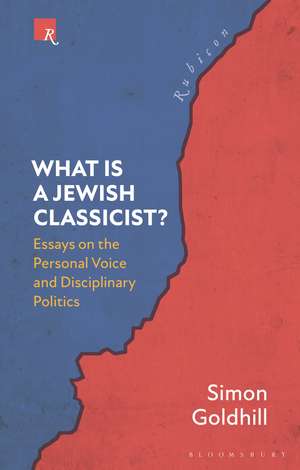What Is a Jewish Classicist?: Essays on the Personal Voice and Disciplinary Politics: Rubicon
Autor Simon Goldhillen Limba Engleză Paperback – 13 iul 2022
| Toate formatele și edițiile | Preț | Express |
|---|---|---|
| Paperback (1) | 119.51 lei 3-5 săpt. | +20.68 lei 6-10 zile |
| Bloomsbury Publishing – 13 iul 2022 | 119.51 lei 3-5 săpt. | +20.68 lei 6-10 zile |
| Hardback (1) | 344.38 lei 6-8 săpt. | +40.90 lei 6-10 zile |
| Bloomsbury Publishing – 13 iul 2022 | 344.38 lei 6-8 săpt. | +40.90 lei 6-10 zile |
Preț: 119.51 lei
Preț vechi: 129.94 lei
-8% Nou
Puncte Express: 179
Preț estimativ în valută:
22.87€ • 24.83$ • 19.21£
22.87€ • 24.83$ • 19.21£
Carte disponibilă
Livrare economică 02-16 aprilie
Livrare express 18-22 martie pentru 30.67 lei
Preluare comenzi: 021 569.72.76
Specificații
ISBN-13: 9781350322530
ISBN-10: 1350322539
Pagini: 200
Dimensiuni: 138 x 216 x 13 mm
Greutate: 0.25 kg
Editura: Bloomsbury Publishing
Colecția Bloomsbury Academic
Seria Rubicon
Locul publicării:London, United Kingdom
ISBN-10: 1350322539
Pagini: 200
Dimensiuni: 138 x 216 x 13 mm
Greutate: 0.25 kg
Editura: Bloomsbury Publishing
Colecția Bloomsbury Academic
Seria Rubicon
Locul publicării:London, United Kingdom
Caracteristici
Of wide interest to academics and students, within or connected to the field of classics - and to prospective students and scholars wrestling with questions of identity and disciplinary politics
Notă biografică
Simon Goldhill is Professor of Greek at the University of Cambridge, UK, and Foreign Secretary of the British Academy. Among his numerous publications are Reading Greek Tragedy (2008), The End of Dialogue in Antiquity (2009), Love, Sex & Tragedy: How the Ancient World Shapes Our Lives (2015) and How to Stage Greek Tragedy Today (2020).
Cuprins
Introduction: Fitting In 1. The Personal Voice: Six Fragments of a Sentimental Education 2. What Is a Jewish Classicist?3. Translation and TransformationNotes Bibliography Index
Recenzii
In these self-reflective essays Simon Goldhill tackles big issues of our era: race and religion, exclusion and belonging, privilege and minoritization. He interrogates the past and present of classics and poses some serious questions to its future.
[This book] repays reading because of its illumination of Jewish responses to prejudice and challenge.
[This book] repays reading because of its illumination of Jewish responses to prejudice and challenge.

